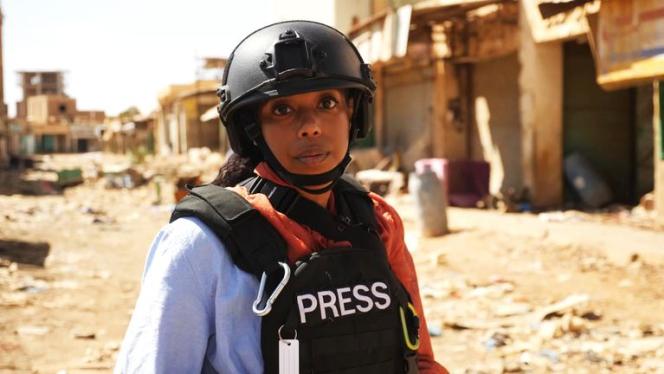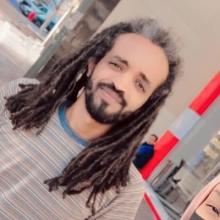Thursday 21 November 2024
Yousra Elbagir on Sudan: “war will not define us”

Sudanese-British journalist Yousra Elbagir speaks to Geeska about the challenges and complexities of covering over a year of conflict in her home country and the stories of resilience which have inspired her throughout.
Yousra Elbagir is the Africa correspondent for the London-based British news channel Sky News. Over the past year, she has been one of the few journalists to regularly visit Sudan to report on the war there.
She was also born in Khartoum and says the experience has been “deeply personal”, telling Geeska that the war has impacted her “family, friends, and everyone I care about from home, making the work both impactful and intense”. When the anniversary of the conflict came along in April, she described it as the “war at home”.
A rare moment that captured this occurred when she unexpectedly bumped into her uncle while trying to conduct final interviews with people evacuating Sudan, as the country descended into what has been 19 months of carnage. “That's my uncle,” she said, as the Sky cameras recorded, a palpable shock in her voice. The way they embraced spoke to how deep her relief was but also how desperate the situation was in Khartoum for those left behind. It was candid and raw and so moving that many other news outlets, from CNN to Arab News reported it.
Many hoped at the start that the generals – Burhan and Hemedti – would be forced to negotiate a ceasefire and resolve their differences. Some had hope about the prospect of even returning civilian rule and moving Sudan away from its militarised politics. Back then, Elbagir wrote: “There are no heroes in this story”. She was, of course, referring to the conflict between Burhan and Hemedti, reminding people of their backgrounds. However, her reporting has also shed light on the everyday heroes who have remained behind, striving to eke out a life amid gunfire, mortars, and airstrikes in the country.
Elbagir reflects on the situation in Sudan, her experiences reporting on a conflict so close to her heart, and why she believes the situation in the country does not receive more attention despite being the largest humanitarian emergency in the world.
Eiad Husham: Can you talk to us about how it has felt to cover a conflict in a country you’ve called home? What kinds of challenges has that brought you personally?
Yousra Elbagir: Covering the conflict in Sudan has been deeply personal, affecting my family, friends, and everyone I care about from home, making the work both impactful and intense. There’s a strong sense of duty among Sudanese voices in media and advocacy, and as a journalist, I feel responsible for getting into Sudan, reaching hard-to-access areas, and amplifying the voices of those directly affected by the crisis.
I’ve been fortunate to have the guidance of my spiritual teacher, Rohini Ralby, whose support has given me clarity at each step, especially in this emotionally charged landscape. This work wouldn’t be possible without the incredible team by my side—camera operator Garwen Mcluckie, producer Leposo Liliane, producer Vauldi Carelse, and my boss Tim Singleton—each of whom deeply understands the story’s significance.
EH: How do you believe your reporting has influenced people’s understanding of the conflict, both locally and internationally?
YE: I believe the reception of our work varies, but our most impactful reports are those where the humanity of the people we interview shines through, making the crisis relatable to anyone, anywhere. On our recent trip, my teacher said that one family can represent thousands of besieged families, and we saw that truth come alive. The anguish of a mother and father, the tears they shed, captured the collective pain of countless others. Through them, we’ve bridged the gap between mere statistics and the profound human reality behind them. This approach has hopefully allowed audiences—whether in Sudan, in the diaspora, or watching on Sky News and social media platforms—to truly see, feel, and understand that this isn’t just a distant conflict; it’s real people, real families, real lives. In that sense, I’m grateful we’ve been able to translate their experiences so meaningfully.
EH: Why do you think the conflict in Sudan hasn’t garnered broader international attention compared to other global crises?
YE: Sudan’s current conflict is misunderstood and often dismissed due to misconceptions, media oversimplifications, and underlying biases. Many assume Sudan is perpetually at war, overlooking the 2019 revolution that marked a hopeful break in this pattern. Now, however, the conflict represents a counter-revolution, reversing hard-won progress towards democratisation. Compounding this, international audiences often see conflicts in Africa as distant and irrelevant, failing to recognise Sudan’s significant geopolitical role and how its resources impact global power dynamics. Persistent biases like anti-Blackness and Afrophobia further normalise violence in Sudan, making it seem less urgent. As journalists and advocates, it’s our responsibility to challenge these biases and bring global awareness to Sudan’s story, which is both complex and deeply consequential.
Compounding this, international audiences often see conflicts in Africa as distant and irrelevant, failing to recognise Sudan’s significant geopolitical role and how its resources impact global power dynamics.
EH: From what you’ve seen, how has the humanitarian crisis impacted everyday life in Sudan, and what more could the international community be doing to help?
YE: The term “humanitarian crisis” barely captures the catastrophic suffering endured daily by millions in Sudan, where every aspect of life is impacted. People who fled Khartoum to supposedly safer cities like Kassala, Gadaref, or Ed Damazin face severe challenges: exorbitant food prices, scarce electricity, lack of clean water, and extreme militarisation.
Those with some resources struggle, while millions of internally displaced persons (IDPs)—now nearly 12 million and counting—are left with nothing, often living in shelters, bus stops, or crowded schools, dependent on community kitchens for one meal a day. These kitchens, however, can only provide so much, being stretched to their limits due to the overwhelming demand.
People who fled Khartoum to supposedly safer cities like Kassala, Gadaref, or Ed Damazin face severe challenges: exorbitant food prices, scarce electricity, lack of clean water, and extreme militarisation.
Displaced people are forced to move repeatedly, often across central Sudan, and there’s little insight into the horrific conditions in areas under siege or RSF control, such as Al Fasher and parts of Khartoum, where people live completely at the mercy of the RSF. The international community can make a difference by pressuring their governments to increase funding for the UN and NGOs, enforce arms embargoes, and hold the UAE, Saudi Arabia, and Egypt accountable for their roles, pushing all sides toward peace. This global silence and neglect only enable a worsening catastrophe, with experts warning that the scale of hunger, displacement, and disease in Sudan is unlike anything seen before. Essential support is also needed for community kitchens and emergency response rooms, which are vital yet hounded by security forces; these efforts require urgent funding and international protection.
EH: What are some of the biggest challenges you’ve faced while reporting in Sudan, especially given the dangers and limitations on the ground?
YE: One of the biggest challenges in covering the Sudan conflict has been the fluid nature of the front lines, which shift unpredictably like expanding and contracting bubbles. Navigating this moving risk, especially with the constant threat of snipers and unclear safety information, is exceptionally challenging. With the guidance of my teacher, a high-risk specialist, we’ve managed to stay safe in unstable areas. Another difficulty is the extensive militarisation, requiring numerous permits and permissions that complicate movement and logistics.
One of the biggest challenges in covering the Sudan conflict has been the fluid nature of the front lines, which shift unpredictably like expanding and contracting bubbles.
While our team is fortunate to have permissions, civilians face intense restrictions and risk arrest without cause. Ensuring the safety of our sources remains a priority, and we’ve been careful to protect their identities and follow up if needed. Embedding with the military has allowed access to previously deserted areas, where we now meet civilians for the first time, and ensuring their comfort and genuine expressions—especially for those relieved to be out of RSF-controlled zones—is critical. I’m immensely grateful to the 82 people, including you, Eiad, who supported us and helped us overcome these challenges, making our latest trip possible.
EH: What are your expectations for a peaceful resolution in Sudan? Do you see any clear path or key factors that could lead to an end to the violence?
YE: The pressure on RSF supporters, such as the UAE, could indeed shift the war’s trajectory since the RSF depends heavily on that backing. Additionally, the army’s recruitment of young men who joined to protect their cities and country could pave the way for future reform. These young recruits, once on the opposite side in the revolution, may be recognised by the army as crucial allies, which could inspire a more inclusive perspective within the institution. However, the unfortunate reality is that certain factions on both sides, including the army, benefit from the war’s continuation, particularly as it garners public support they lost during the revolution. This raises doubts about the political will for peace. Nonetheless, the unprecedented destruction and suffering across Sudan have touched everyone, including those in the security apparatus, creating a shared experience of loss and grief. While it may seem idealistic, I hope this shared suffering can become a bridge, fostering a collective desire for peace across divides.
EH: During your time covering the conflict, what has been the most inspiring or impactful thing you’ve witnessed that has stayed with you?
YE: Honestly, Eiad, it’s the people—it’s their glory, generosity, kindness, and the resilience of the Sudanese spirit that truly stand out. In the most challenging circumstances, the community has banded together, supporting one another and their families. Throughout the different phases of this war, we’ve witnessed various emotional landscapes: the initial shock and disbelief that led many to flee, followed by deep despair and hopelessness just months later.
Yet this latest experience felt different; there was a palpable sense of endurance among the people who had survived this long. They draw strength from the kindness of family, friends, and even strangers, embodying the Sudan I cherish—the Sudan where generosity thrives, where people give everything they can to help each other. This enduring spirit filled me with pride and hope, reminding me that war will not define us but rather how we navigate through it.







